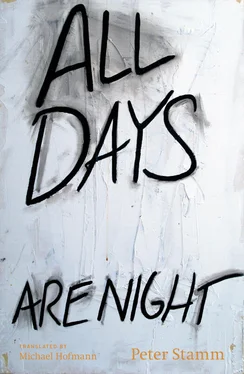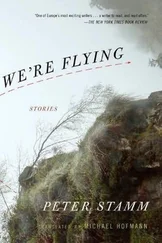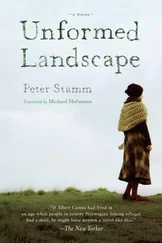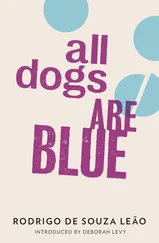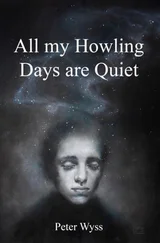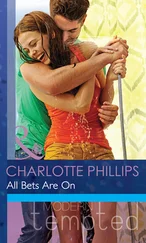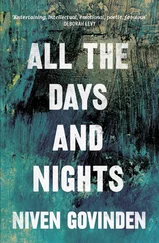Peter Stamm - All Days Are Night
Здесь есть возможность читать онлайн «Peter Stamm - All Days Are Night» весь текст электронной книги совершенно бесплатно (целиком полную версию без сокращений). В некоторых случаях можно слушать аудио, скачать через торрент в формате fb2 и присутствует краткое содержание. Год выпуска: 2014, Издательство: Other Press, Жанр: Современная проза, на английском языке. Описание произведения, (предисловие) а так же отзывы посетителей доступны на портале библиотеки ЛибКат.
- Название:All Days Are Night
- Автор:
- Издательство:Other Press
- Жанр:
- Год:2014
- ISBN:нет данных
- Рейтинг книги:3 / 5. Голосов: 1
-
Избранное:Добавить в избранное
- Отзывы:
-
Ваша оценка:
- 60
- 1
- 2
- 3
- 4
- 5
All Days Are Night: краткое содержание, описание и аннотация
Предлагаем к чтению аннотацию, описание, краткое содержание или предисловие (зависит от того, что написал сам автор книги «All Days Are Night»). Если вы не нашли необходимую информацию о книге — напишите в комментариях, мы постараемся отыскать её.
All Days Are Night — читать онлайн бесплатно полную книгу (весь текст) целиком
Ниже представлен текст книги, разбитый по страницам. Система сохранения места последней прочитанной страницы, позволяет с удобством читать онлайн бесплатно книгу «All Days Are Night», без необходимости каждый раз заново искать на чём Вы остановились. Поставьте закладку, и сможете в любой момент перейти на страницу, на которой закончили чтение.
Интервал:
Закладка:
No pictures, no materials? he asked.
Hubert said he hoped to generate the show here on the spot. Whatever materials he needed he would surely be able to obtain locally.
There’s lots of leftover stuff from previous exhibitions up in the attic, said Arno, you can have a look around if you like. He picked up one of the boxes of slides and went on ahead. For the moment you’re our only resident artist, he said, we were shut over the winter and only reopened a few days ago. You can take your pick of the rooms.
After Arno had shown him all the rooms, Hubert chose one that was large and almost empty, and a long way from the office. Aside from the bed and a dark chest of drawers there was a desk and a couple of old deep armchairs, but neither a phone nor a TV. If Hubert wanted to call anyone, he could always do it from the office, said Arno, the mobile connection was unfortunately very weak down in the gorge. Hubert looked at his cell phone, which indeed said NO RECEPTION. Arno said Hubert would have the building all to himself in the evenings. He brought the box of slides in from the corridor where he had left it and set it down in the middle of the room. Then he was suddenly gone, and Hubert had to bring in the rest of his stuff by himself. As there wasn’t a wardrobe, he left his clothes in the open suitcase and didn’t unpack. He sat down on the bed and stayed like that for a while. He remembered once as a child having been sent up to a vacation camp in the mountains. At midday the bus had stopped in front of a large white house, and those children who had been there before all rushed out into the dormitories to claim the best places. By the time Hubert came up the steps, some of them were already running the other way, to explore. Hubert had sat all alone in the dormitory, not daring to go out. For days he had been homesick and regretted that he was not as enterprising and independent minded as the others.
Hubert knocked on the office door. When he walked in, the first thing to greet his eye was the poster of his first exhibition hanging on the wall behind Arno, a rear view of a naked, rather lumpy woman washing her foot in a sink, presumably the best picture in the series. On the poster was the rather hopeless title of the show, Begegnungen/Encounters , with the dates, September 6–28, 2003.
I’m busy, said Arno, crumpling up a form and tossing it in the trash. Just have a look around and help yourself. If there’s a problem, you know where to find me.
Hubert asked when the other artists would be arriving. Arno looked up from his work and shrugged. There’s a young German woman who takes pictures of swimming pools. She’s due soon, he said, but I don’t know exactly when. Oh, yes, and someone from the local paper is coming to interview you. I hope four o’clock’s okay with you?
Hubert walked through the building. Most of the other doors going off the corridor on either side were to rooms Arno had already showed him. One small room contained the toilets and three shower stalls. At the far end of the corridor was a kitchen with a long wooden table and an array of chairs of which no two were identical. The cupboards harbored pots and pans, dishes, and other gear. On one shelf were opened packets of dry goods, pasta, rice, lentils, chickpeas, and lots of jars and tins of all sorts of spices and condiments. Everything was coated with a sticky layer of grease, some of the dried herbs were years past their sell-by date.
That afternoon he sketched a rough layout of the entrance hall, which doubled as exhibition space, marking the position of outlets and measuring the height of the ceiling. He tried to remember his first exhibition here, but he had the impression he had never seen this room in his life. Finally he went for a walk to look at the locality. He crossed the old bridge beside the cultural center, which crossed the Inn. On the opposite side there was another, smaller building. Over the door he read SPA WATERS, and a scrap of paper taped to the glass door told him that the hall was closed, and no trespassing. Through the dirty windowpanes, Hubert saw evidence of former luxury, lofty pillars and three niches with polished stone facings, and the names of the respective sources over them: Lucius, Bonifacius, and Emerita.
The old road wound its way up the wooded slope. It was off-limits on account of building work, but there was no one to be seen, just a few machines had been left standing around. Hubert scrambled over the barrier and climbed on up the mountain. As he climbed, he kept checking his cell phone, but there was still no reception. He remembered that he hadn’t eaten since breakfast, and he turned back. He decided to get something to eat in the hotel next door.
The sun outside was so dazzling that Hubert could see nothing at all when he walked into the lobby. The large room was full of old armchairs, in the middle was a bar, but there was no one around at all. At a desk behind reception, he finally saw a woman sitting at a computer. Hubert cleared his throat, and she got up. She walked up to the desk, parroting a greeting. She called Hubert “ du ” and explained that that was normal here, even before he could say what he had come for. The restaurant would open at six, she said, at the moment all the guests were out. But he could get coffee and cake here. Hubert thanked her and sat down in a leather armchair in a corner. After a while a young man dressed as a pirate came out and took his order. When the waiter brought his coffee, Hubert asked him about the costume and learned that there was a pirate-themed dinner tonight.
It’s all in your weekly program, said the waiter.
I’m not staying at the hotel, said Hubert, and the waiter laughed as though he’d made a joke.
When Hubert returned to the cultural center a little before four, he saw a large heavyset man waiting in front of the building, with a camera and an enormous telephoto lens. He put out his hand and said he was from the local paper. He was a little early, but perhaps they could get the photos out of the way. While he took his pictures, he asked a few questions, from which Hubert guessed that the man had no idea who he was or what he was doing here. The answers seemed not to interest him either, presumably he just wanted Hubert’s face to be in motion.
My colleague will be here in a minute to interview you, he said, after shooting off two dozen pictures.
Hubert sat down on one of the stone benches in the arcade, and the photographer sat opposite him. They sat there and waited in silence. After about a quarter of an hour, a tiny car drove up, and a black-haired young woman got out. Even as she approached the two men, she was apologizing for being late.
Tamara, she said and held out her hand to Hubert. Then she hugged the photographer. Hubert couldn’t say if she’d kissed him on the mouth or not. The photographer went away. Tamara unpacked a small recording device and set it in front of her on the table. Then she winked at Hubert.
What may we expect from you? Are you still painting naked ladies?
Hubert hesitated.
Tamara said Arno had told her he wanted to develop his new show here in situ, but if he thought he would find models in the village he had another think coming. Because here everyone knew everyone else, and nobody was about to get her kit off for him. Suddenly her voice had an aggressive undertone. Hubert imagined her naked, with that expression on her face. He said he didn’t yet know what the exhibition was going to contain. Tamara said he hadn’t left himself very much time.
I know that, he said, irritated.
Then he remembered what she was there for and said he hoped to find inspiration here. The only driver for his work was desire, a kind of hunger for reality, for presence, and also for intimacy, as opposed to publicity. In a very wide sense, he was interested in transcendence.
Читать дальшеИнтервал:
Закладка:
Похожие книги на «All Days Are Night»
Представляем Вашему вниманию похожие книги на «All Days Are Night» списком для выбора. Мы отобрали схожую по названию и смыслу литературу в надежде предоставить читателям больше вариантов отыскать новые, интересные, ещё непрочитанные произведения.
Обсуждение, отзывы о книге «All Days Are Night» и просто собственные мнения читателей. Оставьте ваши комментарии, напишите, что Вы думаете о произведении, его смысле или главных героях. Укажите что конкретно понравилось, а что нет, и почему Вы так считаете.
